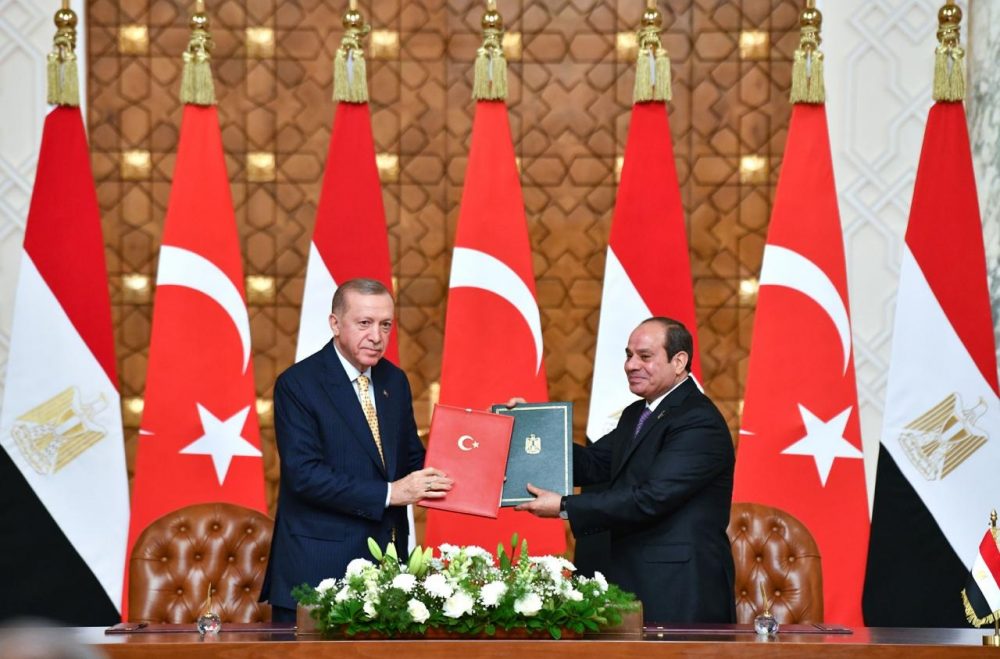What does Türkiye-Egypt normalisation mean for the Middle East? Making friendship not war
On February 14, President of Türkiye Recep Tayyip Erdogan arrived in Egypt to meet his counterpart, President Abdul Fattah al-Sisi, the first such visit since 2012 when Ankara-Cairo almost severed diplomatic ties following the military coup in this country led by al-Sisi. The visit came amid the diplomatic rapprochement between the two states as Türkiye opted for reconciliation diplomacy with all neighbours.
President Recep Tayyip Erdogan said that improving relations with Egypt to a better level will lead to positive results on many regional issues, particularly the Syrian one. The diplomatic rapprochement reached a milestone in April 2022 as, for the first time since the deterioration of the relations, Ankara decided to appoint an ambassador to fill the chargé dʼaffaires position in Cairo.
The evolving geopolitical landscape and developments in the Middle East have prompted Erdogan to recalibrate his stance towards Sisi and the Egyptian government. The visit is seen as a major achievement for Sisi since Türkiye was the only country that had not, until now, recognized the Egyptian government, which had come to power in a military coup.

During face-to-face meeting, both leaders signed several agreements and opted for an increase in trade to $15 billion per year within a few years and diplomatic cooperation in the Middle East. In 2022, Egyptian exports to Türkiye reached $4 billion, reflecting the growing strength of their economic ties. As Türkiye and Egypt forge ahead in their efforts to rebuild Gaza and address regional issues, their renewed partnership promises to bring about positive change in the region.
The diplomatic thaw between the two regional states gained momentum at a very critical time as the Middle East region is plagued with a violent war in the Gaza Strip between Israel and the Hamas militant organization. Despite the local nature of the war, it involves an array of state and non-state actors, such as Iran, Hezbollah, Lebanon, and Yemen's Houthi government. Although Egypt maintained long-term diplomatic relations with Israel, unlike other Arab states, the deteriorating security and dire humanitarian situation pushed Cairo to distance itself from Tel Aviv's rhetoric toward Hamas. Instead, Türkiye took a more critical stance on Israel due to the mounting number of casualties among civilian Palestinians.
In Cairo, Erdogan said the Palestinians were at the top of our agenda and that it was our priority to establish a ceasefire as soon as possible, while Sisi criticized Israel's obstacles which means that humanitarian aid enters Gaza too slowly. In this regard, they stressed the importance of advancing relations between the two countries and building on tangible progress to resume various bilateral cooperation mechanisms.

The mending ties with Egypt appeared as an important milestone after President Erdogan successfully rekindled relations with major Gulf countries like Saudi Arabia and the United Arab Emirates after the long-term diplomatic standoff and bellicose rhetoric. The milestone became even more crucial shortly after Erdogan’s victory in the recent presidential elections in 2023 in order to alleviate regional security concerns.
Consequently, the positive vibes in diplomatic relations between Cairo and Ankara will enable the latter to focus more on domestic issues and close vicinity, such as relations with Iran, Russia, and Central Asia. While the Middle East sank into violence, Iran as a leading regional actor sought an opportunity to deepen its footprint in the region by boosting its proxy forces across the region. Indeed, the growing activity of pro-Iranian militant groups in Türkiye’s immediate neighbourhood is a source of concern.
In a broader context, Erdogan’s attempts to reconcile with neighbours enable him to tighten his grip over internal dynamics, including regional. Moreover, it is essential to get the support of leading regional actors like Egypt to strengthen its pro-Palestine rhetoric and boost his image as the most influential leader of the Muslim East. In addition, the normalized ties with Egypt would halt the Western countries, namely France’s military aid to Cairo, as a part of regional tensions between Ankara and the European Union in the last several years.
In light of continuous military aid to Egypt as the Western key partner, Türkiye significantly developed the local defence industry to compensate for losses as a result of the Western embargo. As such, Egypt-Türkiye diplomatic normalization promises an array of dividends to Ankara in terms of security, economy, and interregional partnership while downgrading potential threats.








